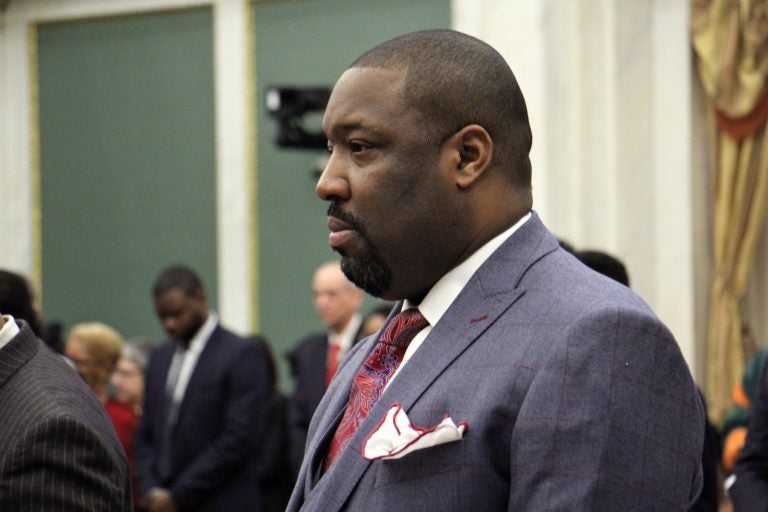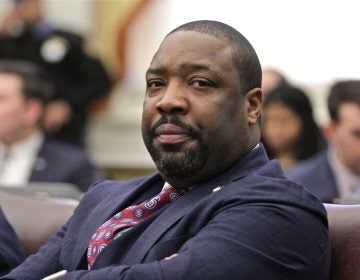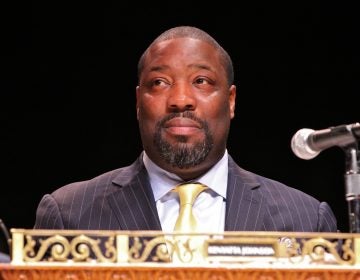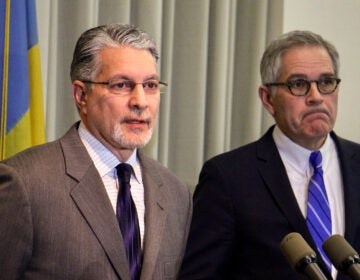Jury deliberations to get underway in the federal bribery trial of Kenyatta Johnson
Closing arguments in the three-week trial focused on contrasting explanations of the true intent of consulting fees paid to the Council member’s wife.

File photo: City Councilmember Kenyatta Johnson. (Emma Lee/WHYY)
During their final pitches to the jury, lawyers in the federal bribery trial of Philadelphia City Councilmember Kenyatta Johnson told vastly different stories about how the lawmaker’s wife came to work for a prominent nonprofit, and what she accomplished while her consulting firm was under contract in 2013 and 2014.
For more than three weeks, the government has argued that Universal Companies hired Dawn Chavous for one reason and one reason only: To funnel bribe money to her husband so he would use his seat on Council to perform political favors for the organization. In this case, enabling the company to maintain control of valuable real estate in Johnson’s legislative district.
Their proof: that Chavous did “very little” work for Universal over the course of her company’s 16-month contract. And that the work she did had minimal value or was never really needed.
“It was all about access to her husband,” said Assistant U.S. Attorney Mark Dubnoff during his closing argument on Tuesday.
While addressing jurors from a podium pointed straight at them, the defense pushed back on that claim, which now threatens to send Johnson, Chavous, former Universal executives Abdur Rahim Islam and Shahied Dawan to prison.
“Common sense and the story you heard from Mr. Dubnoff do not live in the same ZIP code,” said Patrick Egan, Johnson’s lawyer.
The competing narratives came the day before the jury was set to start its deliberations. The panel must decide if each defendant participated in what the government called “quid pro quo corruption.” If convicted, Johnson not only faces prison time, but the prospect of being the second sitting Council member to lose his seat to public corruption charges in 2022. In January, his former City Council colleague Bobby Henon resigned after a jury convicted him of bribery and conspiracy alongside powerful labor leader John “Johnny Doc” Dougherty.
The verdict could hinge on what jurors decide about Chavous’ consulting contract with Universal. Was it a legitimate gig that paid her nearly $67,0000? Or was it a “low show” job used to conceal bribe payments that provided Universal with a much-needed zoning variance and the knowledge that the city likely wouldn’t take back land they sold to the organization years earlier?
Chavous’ attorney, Barry Gross, argued the former on Tuesday, saying nothing that his client did showed that she thought her contract with Universal was fraudulent. What’s more, he said, the government presented no witnesses or evidence that disproved that Chavous did real work for the organization, including work rooted in securing donations from wealthy charter school propents, which sat at the core of her contract with Universal.
“They’re not consultants. They have absolutely — absolutely — no experience or special skills … to look into her work,” said Gross of the government.
But in his 90-minute argument, prosecutor Dubnoff reiterated a figure calculated by the case’s lead investigator: That Chavous had done no more than 40 hours of work during the life of her contract with Universal.
“That translates to an hourly rate of more than $1,660 an hour. Who pays that kind of money? Criminals. That’s who,” said Dubnoff.
The prosecutor maintained that Universal was willing to pay that, and that Chavous and Johnson were willing to throw away their successful careers, because they both desperately needed one another. Universal needed Johnson to perform official acts for the company. And Johnson needed the money to pay off he and Chavous’ considerable credit card debt.
“Kenny Gamble wrote ‘for the love of money people will lie and they will cheat.’ That’s exactly what the evidence has proven in this case,” said Dubnoff, a reference to the legendary music producer and Universal’s co-founder.
While Chavous was under contract, Universal was still trying to redevelop the historic Royal Theater on South Street, then a crumbling eye sore that had sat vacant for decades. By then, the company needed to rezone the site in order to move forward with plans to build a mixed-use development. Having Johnson introduce zoning legislation, said prosecutors, would be the easiest way to make that happen — if the Democrat could successfully skirt city ethics laws by keeping his wife’s connection to Universal a secret.
Universal later sold the Royal for $3.7 million.
During the same period, the city was also pressuring Universal to make good on its contract to build housing on a trio of lots it owned with the Philadelphia Housing Authority on the 1300 block of Bainbridge Street — lots the two entities had failed to do anything with for nearly a decade at that point. The situation caused the head of the Philadelphia Redevelopment Authority to threaten reversion, an often lengthy process that would place the land back into city hands so it could potentially sell it to another developer, according to testimony.
But Johnson told Executive Director Brian Abernathy that he wouldn’t support that effort — words that effectively ended the possibility of reversion, said prosecutors.
On Tuesday, defense attorneys said that simply wasn’t true — that the redevelopment authority had the legal right to take back the land on Bainbridge, whether Johnson supported the move or not.
As for the Royal Theater, the defense argued that Universal never needed to bribe Johnson to get him to introduce the zoning legislation. The lawmaker and the nonprofit shared the same goals of providing affordable housing and good schools to city residents, said Egan. What’s more, they were far from strangers.
“He’d been giving them access and support all along,” said Egan of Johnson, adding that bank records show his client and Chavous were never in bad financial shape during the alleged bribery scheme.
Dawan’s attorney, Thomas Fitzpatrick, argued that Dawan was a “pawn” charged to help the government “find evidence to support some theory” that he was part of a plan hatched to help his employer, Johnson and his wife.
Islam’s attorney, David Laigaie, said his client and Universal needed Chavous to do work for the company, and that the organization he led was never in financial distress, negating the government’s claim.
“If we were financially distressed in 2013, and we needed to do something because of that distress, literally the last thing we would do is embark on a plan to spend hundreds of thousands of dollars,” said Laigaie of redeveloping the Royal.
The jury will start deliberating after getting instructions on the law from U.S. District Judge Gerald McHugh.

Subscribe to PlanPhilly
WHYY is your source for fact-based, in-depth journalism and information. As a nonprofit organization, we rely on financial support from readers like you. Please give today.









